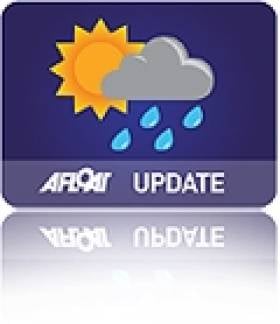Displaying items by tag: Irish Met Society
Irish Weather Symposium for NUI Galway
#nuigalway – A recently-published report by the UN's Intergovernmental Panel on Climate Change (IPCC) makes dire predictions about the adverse effects and impacts of climate change. The Irish Met Society and NUI Galway have joined up to organise a Symposium on ongoing work in Ireland in researching and monitoring of our atmosphere. The Symposium, which will take place in the Martin Ryan Annex Lecture Theatre in NUI Galway, includes presentations on atmospheric monitoring and research activities of national bodies such as the Environmental Protection Agency, Met Éireann and the Marine Institute. It will be held on Saturday next, 5 April from 10.45am and will be followed on Sunday by a trip to the NUI Galway Atmospheric Research Station at Mace Head in Connemara. All details are available on the Irish Met Society website at www.irishmetsociety.org.
The Symposium should be especially relevant to bodies such as local authorities, farming and other organisations where the weather can have an impact on their work. The aim of the Symposium is to encourage more synergy between the various agencies that are active in atmospheric monitoring and to promote greater use of the data collected. It will provide an opportunity for members of the public and individuals directly involved in Atmospheric Research and Monitoring to inform themselves on current activities in those areas.
A highlight of the day features Dinah Molloy, a researcher with the Scott Polar Research Institute in Cambridge. She uses the weather records kept by captains of whaling ships in the 1700s and 1800s to describe the climate at that time. This is of interest in the light of this week's IPCC report, which refers to how recent weather events such as melting ice caps, more intense rains, more frequent storms and heat waves were brought about by climate change.
A presentation on the work of the European Centre for Medium Range Weather Forecasts (ECMWF) in monitoring air pollutants and their effect on the weather brings an international flavour to the event. Other presentations highlight the work of scientists in NUI Galway at an international level, through their work at Mace Head since 1958. This work is led by Professor Colin O'Dowd, a recent recipient of the Royal Irish Academy Gold Medal for outstanding contribution to the Environment and Geosciences. Aspects of their work will include research on the impact of aerosol particles on the sunlight reaching the earth.
Other organisations that will be describing their work are Met Éireann, the Radiological Protection Institute of Ireland, the Marine Institute and the Environmental Protection Agency. The monitoring of radiation levels in the atmosphere, in particular in an emergency situation, is the focus of one presentation. Other presentations describe how data on the atmosphere are gathered at sea using buoys and on land through a network of observing stations. Improving the accuracy of air quality forecasting is addressed in a presentation by the Environmental Protection Agency.
For background and further information contact Paul Halton, President of the Irish Met Society at [email protected]
























































